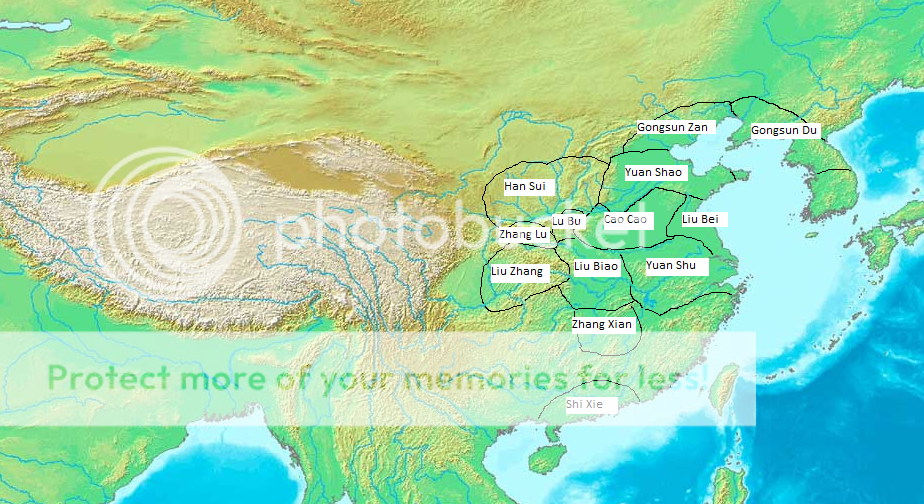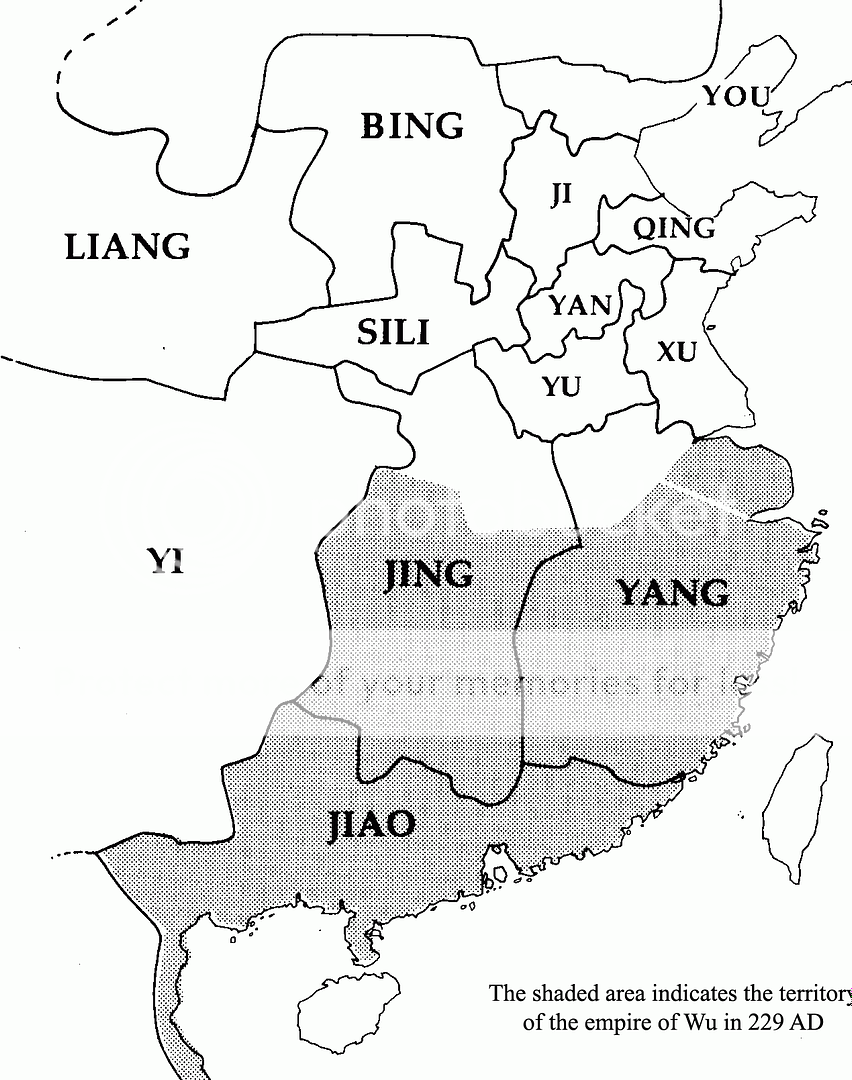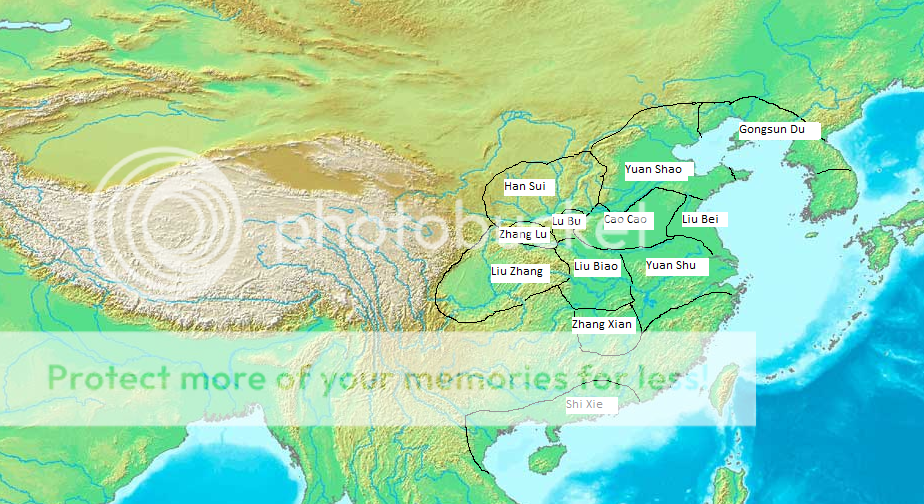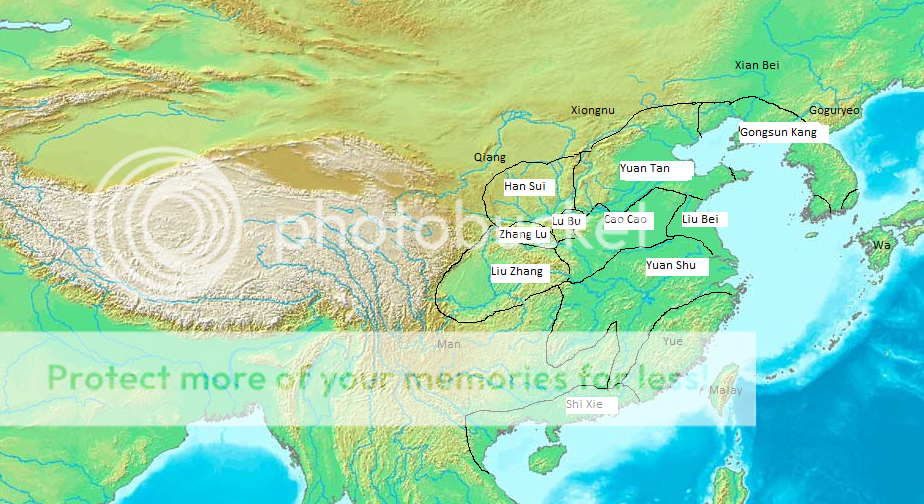200 A.D.
The World is Fractured.
The Han Dynasty which had ruled over China for over four hundred years has finally begun to end. The Han Dynasty had long been decaying. The Emperors of the Han used to be dominated by powerful families of the Empresses who ruled over every aspect of internal affairs of the Han Dynasty. After decades of subjugation by powerful families inside the Capital, the Emperor made an alliance with the Eunuchs to cast out the powerful families that had ruled for so long a time. Many were killed in this restoration of power within the Emperor. This new power came at a price, however. Emperors favored Eunuchs far more than even the most honest officials in the Empire. By the time of Emperor Ling the Emperors had given the Eunuchs power over much of the state's business.
When the Qiang Rebellion took place inside of Liang the Han Dynasty fought a few battles against the foreign tribe that now encompassed the region. Han Sui was a man who worked mostly in the shadows and always chose a figurehead to lead his faction from Liang to never truly reveal who was in charge. Because of this no matter how many "leaders" of the rebellion were taken and executed the rebellion itself would continue as another leader would take up the reins without even the slightest turmoil. Eventually Han Sui's faction came to peace with the Han Dynasty, but remained very independent.
The Yellow Turban Rebellion would occur shortly after the Qiang Rebellion. The Yellow Turban Rebellion was a rebellion centered around a man named Zhang Jiao who claimed to be able to produce miracles, cure the sick, and stop the famines which had been plaguing Northern China for a while now. His rebellion was caught pre-mature and the Han mustered several very talented generals to defeat the Turbans and beat back the tide of decay that had begun with those powerful families all those years ago. A Consequence of the Yellow Turban Rebellion was the onset of Feudalism. The Han stationed Governors over regions in order to take control of their military and domestic affairs essentially making them semi-independent nations.
He Jin, now the man in charge of much of the affairs inside of the Han, was assassinated by the Eunuchs after He Jin's plans on exterminating every last Eunuch made it's way to them. There was some political maneuvering in this as well, but that's not very important. In the power vacuum left behind by He Jin, many people inside of the capital started an indiscriminate slaughter of the Eunuchs and their associates. Even He Jin's brother was killed on suspicion that he may have been aligned with the Eunuchs. Eventually power inside of the capital went into the hands of a man named Dong Zhou.
Dong Zhou is responsible for most of the borders that you see here. He defeated the Qiang and then formed cordial relations with them. He appointed Yuan Shao and Gongsun Du to their current positions. he also arranged for many diplomatic missions between all of the powers. That said, Dong Zhou was a very unpopular leader among the other warlords. Dong Zhou was the man with the most power, and he had good intentions, but his name was ultimately marred by his deposing of Liu Bian and replacing him with his much more able brother Liu Xie. This was used as a pretense by the warlords of China to turn against the Han Government under Dong Zhou.
The "coalition" did not last long and ultimately ended up in the sacking of Luo Yang, one of the most prestigious cities in the Empire, and the relocation of the center of Han power from the middle of China to the West in Chang An. The coalition ended due to infighting between the warlords on how to proceed with fighting Dong Zhou. In the end all the warlords went home, and from there they fought each other constantly leaving Dong Zhou in his position of power. Nearly all the warlords would eventually give nominal submission to Dong Zhou, but under Dong Zhou's rule in Chang An things were different.
In Chang An, Dong Zhou ruled with a military fist. While he treated the military very well, as well as a few officials with the utmost respect, he was a very brash man who terrorized much of the civil class of the capital earning him a great many enemies. Dong Zhou also attempted to kill one of his own Generals, Lu Bu, by throwing a battle axe at him after Dong Zhou caught him with a Maiden. There was no sex, only suspicion. Li Ru tried to ease the relations between the two, but Li Ru became very ill and despite Dong Zhou dropping the issue, Lu Bu did not take kindly to having an Axe thrown at him.
Lu Bu, Wang Yun, and a group of civil officials, made a coup against Dong Zhou. Lu Bu killed Dong Zhou and Dong Zhou's body was left out in the streets. For a small window of time it looked as if the Han could be restored, however in the power vacuum of Dong Zhou's own demise, the Han Dynasty effectively fell leaving only Chang An and the surrounding areas. To make matters worse, Wang Yun would perish shortly after the coup leaving Lu Bu, a military man, in charge of Chang An. While Lu Bu did not make the same mistakes Dong Zhou made, he found himself making entirely new ones such as banning Alcohol. Lu Bu, however, is popular among the Military and has find advisers by his side and excellent generals such as Huangfu Song and Zhu Jun, the generals that brought an end to the Qiang and Yellow Turban Rebellion.
Han Sui went from being the manipulator of a rebellion, to being it's leader, to being the leader of a legitimate faction under the Han umbrella, to being the most powerful force in Liang. Han Sui has clashed many times with the Han Government, but remains as a recognized leader under the Han Government because of one simple fact. Han Sui has power. Since the assassination of Dong Zhou, Han Sui had taken over Ma Teng's lands, as well as invaded and taken over much of Bing territory, dividing it with Yuan Shao.
The Divide of Yi province occurred following the demise of Liu Yan, Liu Zhang's father. Once that occurred, Zhang Lu did not fully recognize Liu Zhang's authority. In response to that Liu Zhang killed Zhang Lu's mother and much of his family that remained in Cheng Du. Because of this Zhang Lu immediately declared outright rebellion against the man who he once called his liege. Zhang Lu took with him Han Zhong and the vast riches it held in the northern frontier. Zhang Lu is considered widely to be a threat to the Han because of his religious sect, which is a sect of Taoism. Zhang Jiao had claimed a Taoist Rebellion against the Han during the Yellow Turban Rebellion. That said, Zhang Lu's rule has been remarkably peaceful and stable. He has an army, but makes no offensive wars. He beat back the two attempts to reclaim the north by Liu Zhang's forces, and has since been hailed as a hero by the people for ensuring that they do not starve, which is something not every warlord can do.
The Divide of Jing is a much more simple division. The southern cities rebelled after being captured by Zhang Xian who in turn declared independence from Liu Biao, who ruled over the much more rich and populous regions in northern Jing. Liu Biao has made no attempt at reconquest, possibly due to the fact that he is surrounded on all four sides by enemies. Yuan Shu, with his general Sun Ce, has constantly been fighting and nibbling away at his Eastern Flank. Liu Zhang had attempted an invasion of his lands, but that failed. To the north there is the mighty and powerful Cao Cao who is himself, surrounded, but can certainly attack Liu Biao if he's not careful. With those considerations Liu Biao is happy to let this minor rebellion over swamp land and minor cities and somewhat important trade routs run it's course. Liu Biao can conquer them all back once the right opportunity presents itself.
Yuan Shu rules over the Huai River region, parts of Yu and Xu, and complete dominion over the Yang Region. Yuan Shu is the third most powerful force in all of China, after his cousin Yuan Shao (being the first) and Cao Cao (being the second) both of which are his most powerful and hated enemies. Yuan Shu originally ruled over a region just south of Dong Zhou's reign near Chang An right where Liu Biao and Cao Cao's land meet (near the top only), however when Yuan Shu went to campaign against rebels who were terrorizing his lands, he found himself at odds with Cao Cao who had supported the rebels. Out numbered 3-1, Yuan Shu was forced out of his own homelands and forced to flee with battered troops dozens of miles across China, held together only by the sheer force of Yuan Shu's will. Once he reached the Huai region he captured a city that used to give him leadership, but had refused him entrance.
From there he quickly established himself taking over nearly everything in sight reaching an unchallenged position of hegemony in the southeast with his only rivals being to the north and west of him. Yuan Shu never claimed a dynastic title as he never heard the prophecy that would spur him to do so. He remained a loyal governor of the Han and had a massive officer and population base who fled from the north from all the wars there. Sun Ce, the son of Sun Jian, one of Yuan Shu's most prominent generals, has been fighting against Liu Biao for the past few years with the rest of his family supporting him all in Yuan Shu's name. currently, Sun Ce lacks a power base to call his own effectively ending any chance he would have at rebelling.
Liu Bei rules over most of the province of Xu. He remains a relatively minor warlord who only attained his position because the civil officials inside of Xu supported Liu Bei's take over of the province after Tao Qian died as opposed to Tao Qian's sons taking over. The reasons why are not entirely certain, but Liu Bei has since won the hearts and minds of the people he rules and the officers who support him. He has been fighting off and on with Yuan Shu, but has since entered into a tenuous peace with him. Liu Bei finds himself in an interesting position regarding the Cao Cao/Yuan Shao situation as he is on good terms with both rulers and could easily align himself to either one to make gains upon another and secure his future. Dreams of being Emperor never occur to Liu Bei now.
Cao Cao rules over Yu, Yan, and Sili, which is a powerful region to occupy rivaled only by Ji and Qing. Cao Cao has had a steady expansion period ever since he took over Yan, he has since expanded into the territories around him. Kong Zhou, Zhang Miao, and other rulers all came to serve him do to his growing power in the region. Once he absorbed all of the small warlords he was left surrounded by major powers at every turn that could easily crush him if two or more of them aligned with one another to defeat him. Since then Cao Cao has been fostering good relations with Han Sui and Liu Bei as a counter balance to Yuan Shao and Yuan Shu as well as giving more nominal submission to Lu Bu's court than most as insurance that Lu Bu will not try to get rid of him by declaring him an enemy of the state. Despite all the warlords being independent, this would mean Cao Cao would be invaded, not out of loyalty, but out of opportunity, and would most likely collapse and be forced to surrender to a warlord who won't kill him or worse flee as a bandit.
Yuan Shao rules over Ji, Qing, and part of Bing province. He rules the most powerful and important territories among the Huang He (Yellow) river. He recently took over Zhang Yang's lands as well as Kong Rong's lands forcing Kong Rong into flight to the north. Yuan Shao has been wanting to take out Gongsun Zan, the man at his flank, for quite some time now, but lacks the pretense. And with his southern Flank now hostile to him he cannot simply invade a powerful warlord's territory and not expect an invasion. The strange part is that Yuan Shao and Cao Cao were not always enemies, in fact they used to be very good friends once upon a time. But time and the positioning of their two empires has left the two at odds for some time now. Yuan Shao also has a similar rivalry with his cousin, Shu, who has been hostile towards Shao for a decade now. Yuan Shao has good relations with Gongsun Du and Liu Bei as a means to ensure that he is not totally surrounded. Despite him being the most powerful man in China, he still bows before the Chang An Government.
Gongsun Zan's rule in the north is mostly reclusive. Since a defeat by the hands of Yuan Shao against him he has remained locked away inside of his capital leaving much of the government of his Empire up to Tian Kai, civil officials, and relatives. Despite Gongsun Zan making it this far inside the history of China, if Yuan Shao had the opportunity to attack him he would be finished very quickly. Instead of fostering relations with Gongsun Du to his East, he attacked him in an attempt to make himself a larger opponent. He was, however, soundly defeated by the superior general despite his smaller army. Now, not only is he locked away inside of his capital, but he's also locked away in a tower of his own design surrounded by concubines to make him forget about his own troubles. If Gongsun Zan had ruled anywhere else he'd be long since defeated by now. Despite this, he is a decent general and has a average power base.
Gongsun Du, the main focus of this timeline, rules over Liao Xi. He was appointed to this position by Dong Zhou upon recommendation by Xu Rong. Liao Xi was a minor district on the fringe of China with hardly anyone taking any notice to it, so Gongsun Du's appointment did not bother anyone. From there, however, he took a depopulated region and turned it into a war machine. He invaded and took over much of the Korean peninsula against powerful Korean Kingdoms. All of the Southern part of Korea gives Gongsun Du their submission. Only the shattered remnant of Goguryeo who fled to the mountains remains any form of independence from Gongsun Du. Gongsun Du has also taken over a piece of Qing province on it's eastern edge where he set up Kong Rong who was fleeing to his court after his defeat by Yuan Shao.
Shi Xie rules over a very distant province far to the south where he has set up rule free from any oversight. He is very popular among the Yue people and rules over rich, if sparsely populated, territory. He was appointed to this position decades ago, and still remains making him the longest lasting of all the warlords. His family occupy all important offices, but the people are happy under his rule and his administration is competent. The divide between him and any other warlord protects him from invasion. He has never declared independence from the Han Government making him Lu Bu's most fervent if most totally irrelevant ally inside the Han government.
The Divisions of China by Province:
(From Rafe's site, Copyright, but allowed by terms of use. Research.)
By Dominion:




